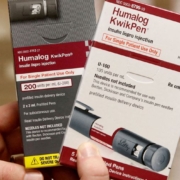The Arkansas attorney general on May 11 accused drugmakers and pharmacy benefit managers of colluding to drive up the price of insulin drugs, the latest in a series of lawsuits to take aim at skyrocketing costs for the life-sustaining medicine.
Children growing up watching The Wizard of Oz remember the first time they saw little Toto pull the curtain back, exposing the Great and Powerful Oz as just a man. And even though he exhorted, “Pay no attention to that man behind the curtain!”—from that day forward, the gig was up. Today, if Toto were to expose how healthcare is paid for in the United States, we would realize that it’s the employer who is “that man behind the curtain.” And although pharmaceutical manufacturers still need to focus their attention on the intermediary companies—like UnitedHealth and Aetna, for example—it is becoming extremely important that they understand the pressure that employers are placing on these companies.
UnitedHealthcare announced a community-based initiative, Community Catalyst, that convenes a broad range of community stakeholders to identify and address specific health care needs of members of the community and residents of publicly assisted housing who are often difficult to reach and serve.
White House scraps proposal to lower U.S. drug prices
Analysts, Cigna, Consumers, CVS Health, Department of Health and Human Services (HHS), Health Insurance, Health Insurers, McKesson, Medicare, Prescription Drug Costs, Retail Pharmacies, Shares, Therapeutics, Trump Administration, UnitedHealth Group, Walgreens Boots Alliance, White HouseThe Trump administration scrapped a proposal for lowering prescription medicine prices, backing down from a policy that would have required health insurers to pass on billions of dollars in rebates they receive from drugmakers to Medicare patients.
UnitedHealth Group Inc. won anti-trust approval to buy DaVita Inc.’s primary and urgent care unit for $4.3 billion, the Federal Trade Commission said.
Eli Lilly and Co. pulled ahead in a three-way race with Amgen Inc. and Teva Pharmaceutical Industries Ltd. in attracting new patients to a new class of migraine drugs, and seeks to build on that advantage by stressing that the company’s therapy can completely prevent headaches in a small percentage of patients.
The obscure advisory committees at the heart of the U.S. drug pricing debate
Breakthrough Therapy Status, Congress, CVS Health, Diabetes, Donald Trump, Drug Prices, Duchenne Muscular Dystrophy (DMD), Express Scripts Holding, FDA, Migraine, Multiple Sclerosis, Pharmacy Benefit Managers, Spinal Muscular Atrophy (SMA), UnitedHealth GroupExpectations were high during 2018 for three new migraine drugs hitting the market from Amgen Inc., Eli Lilly and Co. and Teva Pharmaceutical Industries Ltd. Priced around $7,000 each, the drugmakers called them “breakthrough” treatments designed to prevent migraines when taken year-round, and estimated that millions of patients could benefit. But a small group of medical experts who quietly advise U.S. health insurers on new drugs was not impressed, according to a private meeting held at UnitedHealth Group’s OptumRx offices in Chicago that was attended by Reuters.
Three drug-pricing controls emerge in U.S. market
Aetna, Apps, August 2018, Biosimilars, CVS Health, Department of Health and Human Services (HHS), Drug Pricing, DTC, Express Scripts Holding, FDA/Regulatory, Formularies, Issue Archives, Medicare, Medicare Part D, Sales & Marketing, Trump Administration, UnitedHealth GroupAs drug prices fall under increased scrutiny, payers and regulators are targeting some key initiatives that could change the dynamic of pharmacy benefit management over the next 12 months. These emerging trends point to potentially rougher terrain for drugmakers looking to increase market share as payers take a more active role in enforcing formularies.
Most employees with access to workplace wellness programs say they have made a positive impact on their health, even though a majority are unwilling to devote more than one hour per day to health-related activities such as consistent exercise, according to a new survey.



